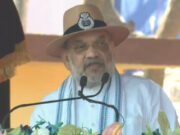The three planned semiconductor plants are poised to significantly contribute to India’s chip production capacity, with projections of 50,000 chips per day in Dholera, 48 million in Morigaon, and 15 million in Sanand. (Photo: News18)
Prime Minister Narendra Modi on Wednesday virtually laid the foundation stones of two semiconductor facilities in Gujarat and one in Assam, while he emphasised India’s commitment to delivering on its chip-focused initiatives, highlighting the government’s efforts through programmes like the India Semiconductor Mission and policies aimed at bolstering the sector’s ecosystem
A tripartite foundation stone-laying ceremony was held on Wednesday in Gujarat’s Dholera and Sanand cities, and Assam’s Morigaon district, marking a significant stride towards India’s semiconductor self-reliance. Several central and state officials as well as chip industry experts were present at the event, while Prime Minister Narendra Modi joined in via video link. “India commits, India delivers,” he said.
During the ceremony, the PM emphasised India’s commitment to delivering on its chip-focused initiatives, highlighting the government’s efforts through programmes like the India Semiconductor Mission and policies aimed at bolstering the sector’s ecosystem in the country.
“The 21st century is a tech-driven century, and without semiconductors, it can’t be imagined. Made in India as well as Design in India chip will take the lead,” he noted.
Union minister for electronics and information technology Ashwini Vaishnaw, who was present at the Dholera ceremony, hailed the occasion as the realisation of an initiative that began in 1962. He credited PM Modi’s decisive and forward-looking mindset for making the simultaneous foundation stone-laying ceremonies possible, noting the historic significance of the day for India’s future generations.
While speaking on the importance of the semiconductor ecosystem, N Chandrasekaran, chairman of the board of Tata Sons, outlined three crucial reasons: the global chip shortage underscoring the need for self-reliance, the escalating threat of cyber warfare, and the necessity of a robust domestic semiconductor industry for both domestic consumption and global export.
Gujarat chief minister Bhupendrabhai Patel lauded Dholera’s strategic location for industrial facilities, citing its ease of transportation, be it because of an international airport or a water port, and potential to generate upwards of 50,000 jobs. Vaishnaw elaborated on Dholera’s advantages, including water availability, electricity infrastructure, and renewable energy projects close by, conducive to semiconductor fabrication.
Along with the Dholera fab which was established by Tata Electronics Private Limited (TEPL) and Taiwan’s Powerchip Semiconductor Manufacturing Corp (PSMC), the Prime Minister also laid the foundation stones for two other semiconductor plants in Sanand and Morigaon.
The three planned semiconductor plants are poised to significantly contribute to India’s chip production capacity, with projections of 50,000 chips per day in Dholera, 48 million in Morigaon, and 15 million in Sanand.
Prime Minister Modi hailed the occasion as a historic step towards a brighter future, underscoring its significance for India’s youth and the nation’s aspirations to become a trusted partner in the global semiconductor supply chain. He highlighted the necessity of reliable chip manufacturing capabilities, especially in light of the Covid-19 pandemic, and expressed confidence in India’s potential to emerge as a global powerhouse in commercial chip production.
Union minister Vaishnaw later confirmed production timelines, with Micron chips expected by December 2024 and Dholera’s inaugural chip slated for December 2026.




































